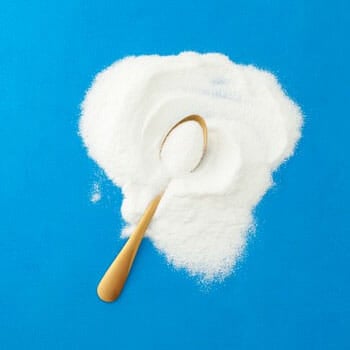Whey is known as the king of all protein supplements.
For individuals that are lactose intolerant, however, it’s also something to be wary of.
Issues like bloating, indigestion, and diarrhea are all factors that very few are willing to incur just to get a bit of extra protein.
I’ve spent hours researching what exactly whey contains to help you get to the bottom of this question once and for all.
Quick Summary
- Whey protein contains low levels of lactose, making it generally safe for individuals with mild lactose intolerance, but it may still cause discomfort in some cases.
- Whey protein is available in different forms, such as whey concentrate, whey isolate, and hydrolyzed whey, each with varying lactose content.
- According to the Whey Protein Institute, one tablespoon of whey protein contains about 0.1 gram of lactose, highlighting its low lactose content.
- Personally, I find that whey isolate and hydrolyzed whey are excellent options for my clients with lactose intolerance, offering high protein with minimal discomfort.
Does Whey Contain Lactose?

Whey, a liquid component of cow's milk, is processed into protein powders for shakes.
It contains minimal lactose, with the amount varying by product.
Popular for its essential amino acids, whey aids in muscle growth and repair.
In my experience, whey protein, while low in lactose, can still cause mild discomfort for some of my clients with sensitivity.
Whey protein, favored by bodybuilders and athletes for its nutrient boost, contains much less lactose than milk.
Some whey protein types are refined to be lactose-free. It comes in three forms: whey concentrate, whey protein isolate, and hydrolyzed whey.
Beyond its lactose content, whey protein may also play a significant role in gut health, potentially influencing gut flora and offering benefits even for those who are not lactose intolerant.
Can You Have Whey if You Are Lactose Intolerant?

Individuals' ability to consume whey protein varies with their lactose intolerance level.
From coaching athletes with lactose intolerance, I've seen that some can handle whey protein well, especially isolates.
Those with low lactase enzyme levels, indicating lactose intolerance, may struggle to digest lactose-rich products, often experiencing symptoms like bloating, diarrhea, and gas.
The impact of whey on individuals with lactose intolerance varies based on the intolerance level and whey type.
Whey isolate and hydrolyzed whey, with lower lactose levels than whey concentrate, are often more suitable for those with lactose intolerance.
Recent technological advancements in whey protein processing are aimed at reducing its lactose content and enhancing its overall nutritional profile, marking a significant step forward for those with lactose sensitivity.
According to the Whey Protein Institute, one tablespoon of whey protein contains about 0.1 gram of lactose [1].
Therefore, if you experience mild to moderate symptoms after ingesting dairy, the Whey Protein Institute claims you should be able to comfortably take whey protein without any serious repercussions.
Additionally, taking whey protein shakes may even help individuals with their allergies.
Researchers noted that [2]:
“The ingestion of… fermented and matured dairy products can assure an adequate milk intake while preventing the onset of intolerance symptoms.”
- Massimo Montalto, Gastroenterologist
How Much Lactose is in Whey Protein Powder?

Through my years of coaching, I've noticed that the amount of lactose varies depending on the type of whey protein and the manufacturer.
Each type of whey protein contains different concentrations of both protein and lactose.
- Whey Concentrate is the rawest form of whey and contains around 30 - 70% protein, with large amounts of lactose. (See the best whey concentrate powders)
- Whey Isolate powders are more refined and ultra-filtered. This increases the protein content and reduces lactose concentration, making it contain up to 90% protein content and less than 0.1 gram per every 20-gram scoop.
- Hydrolyzed Whey is a special kind of whey isolate. It contains a similar concentration of protein and lactose, with the difference being that it goes through a pre-digested process. This process breaks down the whey isolate, making it exceptionally easy to digest and absorb. (See the best hydrolyzed whey powders)
For people who are lactose intolerant, hydrolyzed whey and whey isolate are the safest options they are able to digest.
What Protein Powder is Best for Lactose Intolerance?

Whey isolate and hydrolyzed whey powder are the best types of protein powders for lactose intolerant individuals. In my professional experience, lactose-intolerant clients have had great success with whey isolate and hydrolyzed whey. I recommend you check this list for the best lactose-free protein powders.
For people with dairy allergies and severe lactose intolerance, however, the minuscule amounts of lactose can still be problematic.
Other powders that do not contain lactose include:
Plant-based Proteins
Plant-based, lactose-free proteins are ideal for vegans and those with lactose intolerance.
While they have fewer amino acids than whey, they're hypoallergenic with minimal side effects. Common sources include yellow peas, brown rice, and nuts.
To fulfill daily protein needs, supplementing with protein-rich foods alongside plant-based powders is recommended.
Egg-White Protein Powder
A lactose-free protein powder extracted from dried eggs. It contains lower protein content compared to whey but is easily digestible and contains minimal allergens.
Check this post to see which are the best egg-white protein powders.
FAQs
What Are the Benefits of Taking Whey Protein Powder?
The benefits of taking whey include increased muscular development, reduction in inflammation, and greater weight loss.
It makes whey protein a popular choice amongst athletes for upping their protein intake through protein shakes.
Are There Side Effects To Taking Too Much Whey Protein?
When used in excess amounts, whey protein may cause:
- Abdominal pain
- Nausea
- Bloating
- Facial swelling
- Fatigue.
Over time, excessive consumption of protein shakes may lead to liver and kidney problems, which can be fatal.
How Much Whey Protein Should You Take in a Day?
The recommended dosage is 25 - 50 grams per day, depending on personal protein demand.
It is also advisable to follow the manufacturer’s directions regarding dosage and instructions for use indicated on the label.
Related post: How Many Scoops of Protein Powder Should You Take per Day?
References:
- http://www.wheyproteininstitute.org/sites/default/files/whey-protein-isolate-facts.pdf
- https://www.ncbi.nlm.nih.gov/pmc/articles/PMC4066025/
About The Author
You May Also Like






